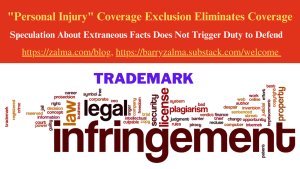“Personal Injury” Coverage Exclusion Eliminates Coverage

Blog Post 4672
See the full video at https://rumble.com/v3x1wsl-personal-injury-coverage-exclusion-eliminates-coverage.html and at https://youtu.be/XfyWqrSsU3U
AutoDistributors, Inc. and Steven Schneider (collectively “AutoDistributors”) appealed the district court’s order granting judgment on the pleadings in favor of Scottsdale Insurance Company, Nationwide E&S Specialty, Scottsdale Indemnity Company, and National Casualty Company (collectively “Defendants”). In Autodistributors, Inc. et al v. Nationwide E&S Specialty; et al., No. 22-16445, United States Court of Appeals, Ninth Circuit (November 17, 2023) the Ninth Circuit interpreted the insurance policy.
This case arose from an underlying dispute between Sixt Franchise USA, LLC, Sixt Rent a Car, LLC (collectively “Sixt”), and AutoDistributors. Sixt Franchise and AutoDistributors entered into a Franchise Agreement that allowed AutoDistributors to operate a Sixt rental car franchise and use Sixt’s trademarks in connection with that franchise. Sixt sued AutoDistributors claiming it violated the Franchise Agreement by operating a used-car-sales business at the franchise location and using Sixt’s trademarks in connection with that business.
AutoDistributors tendered the suit to its insurer Scottsdale Insurance Company (“Scottsdale”), and Scottsdale refused to defend or indemnify. AutoDistributors sued the Defendants for breach of contract and breach of the implied covenant of good faith and fair dealing. The district court ruled for Defendants, holding that Scottsdale had no duty to defend AutoDistributors.
DUTY TO DEFEND
An insurer must defend a suit which potentially seeks damages within the coverage of the policy. To determine whether there is a duty to defend, the insurer compares the terms of the policy with the allegations of the complaint and any other facts that are reasonably inferable or otherwise known.
If the allegations suggest a possibility of coverage, the duty to defend is triggered-even if the precise causes of action pled by the third-party complaint fall outside policy coverage.
AutoDistributors’ insurance policy covers “personal and advertising injury,” defined to mean injury “arising out of” a specified list of offenses. The policy excludes “‘personal and advertising injury’ arising out of the infringement of copyright, patent, trademark, trade secret or other intellectual property rights” (the “IP Exclusion”).
Some Of Sixt’s Allegations Clearly Fell Outside The Policy’s Coverage.
Sixt alleged that AutoDistributors breached the Franchise Agreement by “operating the unauthorized Used Car Sales Business at the Store” and “using the Store to facilitate a start-up incubator business.” That alleged conduct did not implicate any of the offenses in the definition of “personal and advertising injury,” so it did not trigger the duty to defend.
Sixt also alleged that AutoDistributors infringed Sixt’s trademarks by using the trademarks in connection with the used car business. Based on these allegations, Sixt alleged claims of trademark infringement and false designation of origin under the Lanham Act, common law trademark infringement, and common law unfair competition. This theory was also part of Sixt’s breach of contract claim because Sixt argued that the Franchise Agreement restricted the use of the trademarks.
Even assuming that trademark infringement would constitute a “personal and advertising injury,” there was no coverage for these claims because of the policy’s IP Exclusion. That exclusion provides that the policy does not cover “personal and advertising injury” arising out of the infringement of “trademark.”
Although the Sixt Complaint used the word “slogan” once, that single word did not trigger the duty to defend when read in context. AutoDistributors points to no allegation in Sixt’s Complaint describing AutoDistributors’ use of items associated with Sixt’s slogans, as opposed to Sixt’s trademarks.
An insured may not trigger the duty to defend by speculating about extraneous “facts” regarding potential liability or ways in which the third party claimant might amend its complaint at some future date. The extrinsic facts which may create a duty to defend must be known by the insurer at the inception of the third party lawsuit.
Personal Injury liability coverage is a very broad coverage providing defense and indemnity for multiple types of offenses. The Scottsdale policy in this case provided a Personal Injury coverage but limited it with an IP exclusion that defeated the claim of AutoDistributors because it was clear and unambiguous.
 (c) 2023 Barry Zalma & ClaimSchool, Inc.
(c) 2023 Barry Zalma & ClaimSchool, Inc.
Please tell your friends and colleagues about this blog and the videos and let them subscribe to the blog and the videos.
Subscribe to Excellence in Claims Handling at locals.com at https://zalmaoninsurance.locals.com/subscribe or at substack at https://barryzalma.substack.com/publish/post/107007808
Go to Newsbreak.com https://www.newsbreak.com/@c/1653419?s=01
Follow me on LinkedIn: www.linkedin.com/comm/mynetwork/discovery-see-all?usecase=PEOPLE_FOLLOWS&followMember=barry-zalma-esq-cfe-a6b5257
Daily articles are published at https://zalma.substack.com. Go to the podcast Zalma On Insurance at https://podcasters.spotify.com/pod/show/barry-zalma/support; Go to Barry Zalma videos at Rumble.com at https://rumble.com/c/c-262921; Go to Barry Zalma on YouTube- https://www.youtube.com/channel/UCysiZklEtxZsSF9DfC0Expg; Go to the Insurance Claims Library – http://zalma.com/blog/insurance-claims-library.
Like this:
Loading…
Related
About Barry Zalma
An insurance coverage and claims handling author, consultant and expert witness with more than 48 years of practical and court room experience.







